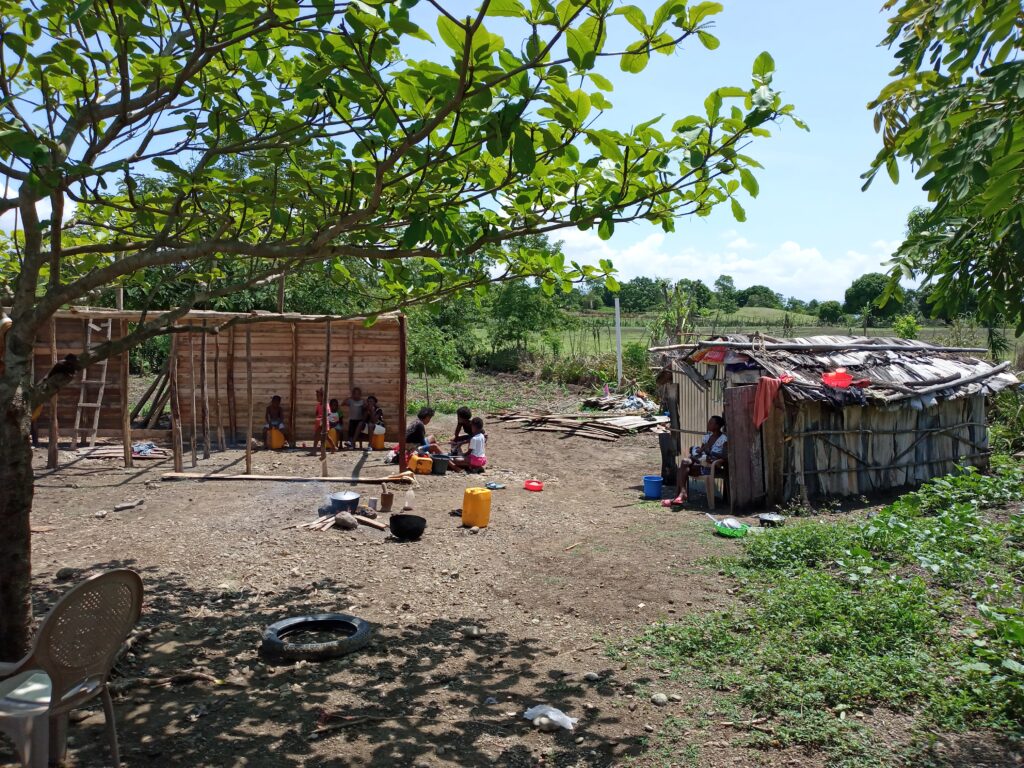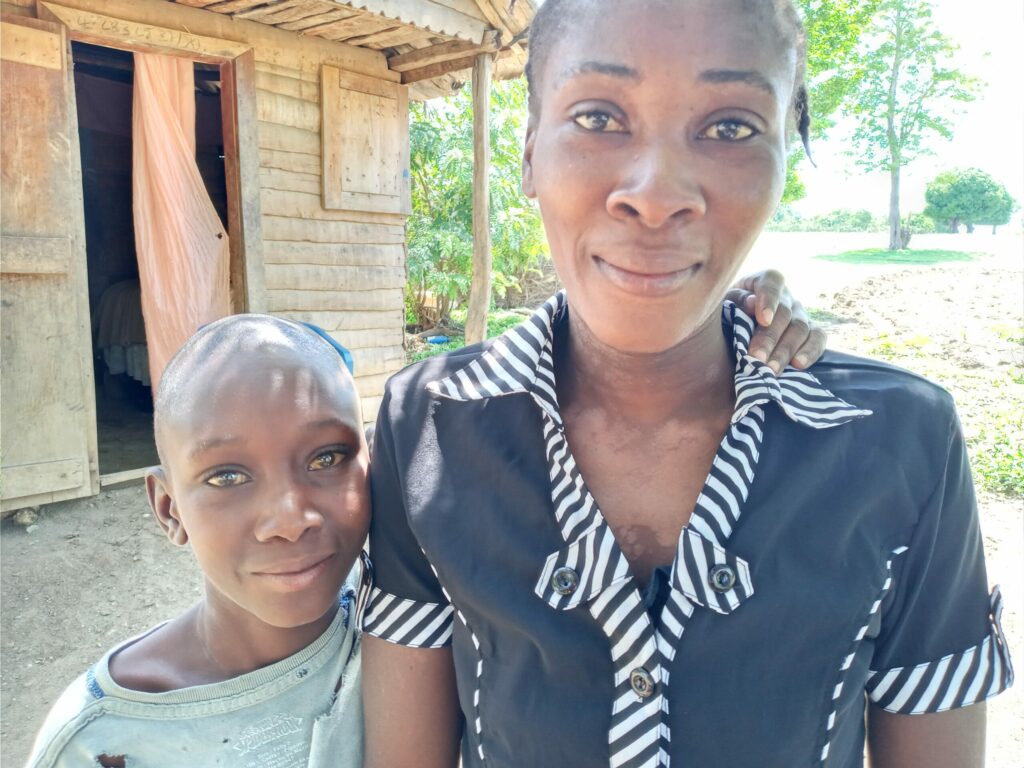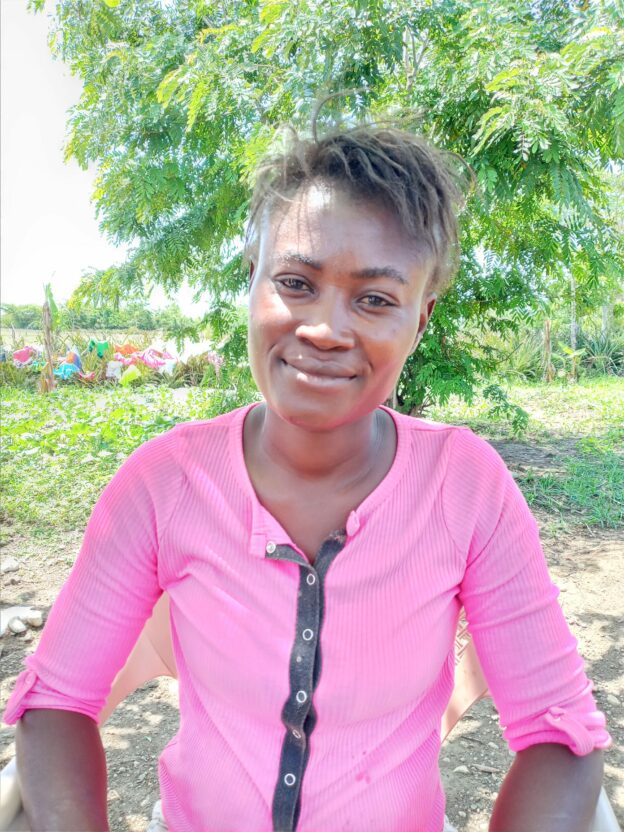Eveline Joseph is one of two sisters who live in neighboring yards in Savann Plat, a broad area of extreme southern Ench that stretches out east of the national road through the Central Plateau. It’s where they were born and raised, and where they found two brothers to share their lives with. They are part of a cohort of 400 families who joined the CLM program in January.
Eveline lives in a small shack thrown together out of tach, the tough pods that palm seeds grow in. Tach is the most common roofing material for poor Haitians in the Central Plateau, but Eveline’s house is enclosed by walls of tach as well. She uses the few sheets of roofing that she has as the house’s front wall.
It’s a full house. She and her husband have two children, and the four were recently joined by her younger brother and his pregnant girlfriend. “He has other sisters, but I guess he decided he feels most comfortable with me.”
She’s excited to be part of CLM, because things have been so hard. “I didn’t have anything, and neither did my husband. Even if we needed just 50 gourds for something, we would have find a day’s work in a neighbor’s field.” The two would spend their days looking for someone who might need help in the field. Occasionally, her partner would make kayèt, tubes formed out of the same palm-seed pods that most of their house was made from. He’d sell them to makers of rapadou, an unrefined sugar popular across Central Haiti. The sugar is sold in cylinders about two feet long and three-four across. The kayèt are easy to sell, but bring in very little return.
She’s gotten off to a strong start, especially with construction, but she’s encountered problems, too. When they started to dig a latrine pit in her yard, it filled with with water right away. So they tried on the other side of the yard, and they were able to complete a pit, but it too filled with water within a few days. So they started a third pit, and were able to finish it and to cover it with a concrete slab and install the seat, but then it, too, started flooding. She isn’t yet certain what the best solution is, but she’s frustrated. “The other women don’t have this problem.”
She’s also started work on a new house. It will have two rooms and a porch. She got a builder to begin even before the CLM program provided building materials. The frame is already up, and the walls are going up as well. They are made of palm-wood planks. She started by purchasing 2000 gourds of planks. She got them at a good price because she had family members willing to sell them to her. She collected the money by contributing a portion of her weekly stipend to a savings club. “When it was my turn [to collect the pot] I used it all to buy wood for the house.”
She chose livestock for both her businesses — two goats and a pig — and she has an easy time explaining her choice. “When they start having young, I can sell the young to buy other things.”
She’s never had a small commerce, but she’d like to start one. The problem is that she isn’t sure how to get started, because she doesn’t yet see where she’ll find the means. One thing she feels certain about is that she doesn’t want to borrow money to establish a new business. “When you have children, it doesn’t make sense. Any time they are hungry, you’re going to reach into the business to feed them, so the business will dry up fast.”


Eveline’s older sister Darline lives with her partner and their two kids in a wooden home within a hundred yards of Eveline’s. “The land belongs to our husbands’ uncle. He lets us live here.”
Like Eveline, she had nothing when she first joined the program, but unlike her sister, for Darline things had not always been that way. She had had her own small business selling snacks: peanut butter on bread or a Haitian flatbread made of manioc called “kasav.” Sometimes she’ll sell cookies, crackers, or candy, too. She would buy her provisions on Tuesdays, at the nearby market at Nan Pòs, spending from 1500 to 10,000 gourds, depending on what she had. She made sales on Wednesdays, Fridays, Saturdays, and sometimes Sundays at local cockfighting rings. “It was a good business. I could always find a little money when I needed it.”
She lost the business because of an accident. She and her husband had planted a small crop of sugarcane in a field next to their house. They harvested it themselves, and rented a local mill to turn it into molasses. While they were milling the cane, a neighbor’s child, who was playing at the mill, was injured badly. He was in the hospital for months recovering, and all the costs fell on Eveline and her husband. They burned through all the money they had. Eveline was left looking to her neighbors for income. She would go out mornings asking whether anyone needed someone to do laundry or to shell their peanut crop.
Like Eveline, she chose goats and a pig as her two enterprises, and both goats are now pregnant. And Darline’s hopes are high. Both goats are showing four distinct nipples on their udders. This is often taken as a sign that they will give birth to multiple kids — three or even four. “I want to sell the kids to buy a larger animal, like a cow. I’ll be able to use them to pay for school, too.”
She’d like to get back into business, but she doesn’t want to return to the same one she’s had in the past. “I am a Christian now. I don’t want to go to cockfights.” She’s thinking of used clothing or basic groceries, which she would sell in the markets. There are four major markets — Nan Po, Nan Kas, Tomond, and Ench — reasonably close to her house. She thinks she’ll need about 10,000 gourds to start.
